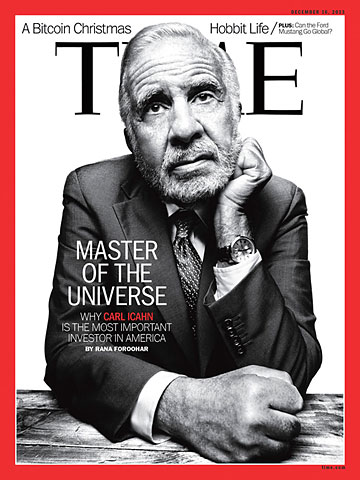
(6 of 8)
Icahn had "smart genes," says his longtime friend Ira Ellenthal, a publishing executive who grew up in the same neighborhood and later shared an apartment and double-dated with Icahn during his early days in Manhattan. "I don't think he had the happiest childhood, though." Back then, quips Icahn, "smart Jewish kids became doctors, and if you weren't that bright, you were a lawyer." When he graduated from Princeton, he started medical school. His father, in typical form, thought it was a good move, since Carl "had no real talent" for anything else. But he soon dropped out and began a career on Wall Street, at Dreyfus, where he put his mathematical skills to good use trading stocks and bonds and edging out the competition with complex options bets on whether assets would go up or down.
"I liked it because back then, it was kind of arcane," says Icahn, who was and is a voracious reader of financial information, like Buffett. Although Jack Dreyfus, the firm's leader, saw a bright future there for the young trader, Icahn always saw himself as a "lone wolf" and eventually started his own firm, making and losing many fortunes before becoming the Wall Street legend that he is now.
I ask him if his father ever acknowledged what a success he'd become. Icahn nods, sips his second martini and tells a story of how his dad, who knew he did complex arbitrage deals, came to him a few years before he died with a yellow pad and pencil. He pushed them across the table and said, "Show me what you do, son. Show me how you do it." Icahn tears up. "I said, 'You finally admit it, huh?' And he said, 'Yes.' He wasn't a demonstrative man, but he came over and hugged me."
Icahn's glee, then and now, at bringing down corporate fat cats is partly the legacy of his father, a socialist with conflicted beliefs (he was an atheist cantor) and thwarted ambitions who dreamed big (he wanted to be an opera star at the Met) but achieved little. "I think I inherited from my father a certain sense of outrage about people who believe themselves to be entitled," says Icahn. "He was always ranting and raving about them." It rubbed off on his son, who says he "never wanted to be Establishment" and professes any number of economic and political opinions that would please the left. He thinks, for example, that the Tea Party obsession with the deficit is overblown. He thinks that Fed chairman Ben Bernanke has done a great job and that President Obama is right to worry about inequality and stagnant wages for the lower and middle classes. (Icahn, historically a conservative, says he's disenchanted with "dumb" Republican gaffes like Mitt Romney's "47%" comment and didn't vote in 2012.) He thinks the 1% are taking home too much of the country's income. "Most of these guys don't earn what they make."
The Chutzpah Factor
